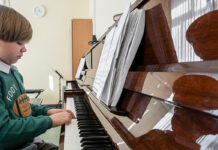“Good afternoon, Dmitry Gennadievich! Read Your articles and enjoy. Rejoice in the fact that not everything in this world is stormy lost. Help me to return to Russian poetry, and readers of the name of Boris Konstantinovich Kovyneva – present Russian nugget.
I met him in 1968 in Moscow. Boris Konstantinovich lived in a Studio apartment in the house on Maple Boulevard. At that time he was already seven years been bedridden, is in poverty. Left arm and leg were paralyzed. Right hand he slightly raised up, and he brought me her autograph on their books. Wife did not work and cared for him. Kovynev was a member of the writers ‘ Union, but a penny of assistance from this Union he received. His wife, Elena Borisovna Valley, was denied the pension for the care of seriously ill. And friends?
Friends came rarely. So my arrival, he waited impatiently.
I come from the North Caucasus, Boris Konstantinovich, with a special interest listened to my stories about the manners and customs of the highlanders. And he read me his poetry. Every time I asked him to read the poem “Violin”. This is his signature issue. In the Soviet Union, these poems are not printed.
Now in the Internet you can find a rumor that Kovynev sat. Yes no what camp he was sitting down!
Shortly before his death, Boris K. called me over, looked and said:
– Gregory, I wrote: “the Twenty-second of June, exactly at four o’clock, Kiev was bombed, we were told that the war began…”
my face was not only surprise. I knew it – people! The whole country knew.
Then Elena Borisovna, wife of Boris Konstantinovich, pulled out boxes of yellowed newspaper. I read the full text of this poem. Signature at the bottom – Boris Kovynev.
And it was so. At the beginning of the war, Boris Konstantinovich took his poem “the Twenty-second of June…” in the newspaper. A talented composer Boris Prozorovsky wrote these lyrics of a song to the tune of “Blue handkerchief”. The song picked up, and it rapidly raced to all corners.
In this situation, who thought about the author? Yes, this question no one was interested, everyone thought that song popular.
But before the war Kovynev was not an obscure provincial author. He corresponded and met with Bitter. Boris Kovynev – author of the song, which is almost every day sounded on the radio – “Steel squadron” (“Aviamarsh”). Therefore, it is difficult to understand why the poet so quickly erased.
Died Boris K. on March 3, 1970. He was buried at the cemetery Vagankovsky. I overlaid it with a tomb of marble. First courted, then there was a long break – I worked in Antarctica as an engineer on operation of planes and engines. I have participated in seven Antarctic expeditions.
In his first expedition we went on the ship “Bashkiria”to the Canary Islands. Tobought the radio. In the evening went to the upper deck of the ship. Include receiver. And suddenly – the music and the words are familiar:
In every heart there is
aspiration above,
every heart
zaplacen not crying.
In the restaurant on the stage went out.
Poverty gnawed violinist.
Oh, my God! Yes, it’s – “Violin” Boris Konstantinovich!
Can we sleep?..”
Twenty second of June
at Exactly four hours
Kiev was bombed
We announced
What started the war.
Ran a time of peace,
it’s time for Us to part.
I am leaving
to Be promise
Faithful to the end.
you see
With a sense of my do not mess!
Come, friend,
train To the other,
Other on the front walk.
Falter wagon wheels
Train rush boom.
You told me from the platform,
I’m with echelon
Sad wave of the hand.
years
Again I will meet you.
your smile,
To heart will be pressed
And kiss, love.
Boris Kovynev, June 22, 1941
Write to Dmitry Shevarov: dmitri.shevarov@yandex.ru











































